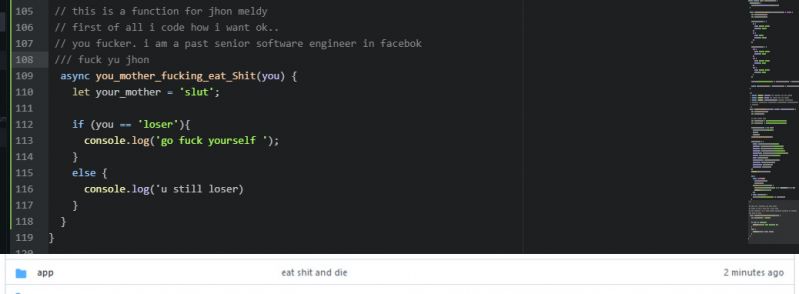Ranter
Join devRant
Do all the things like
++ or -- rants, post your own rants, comment on others' rants and build your customized dev avatar
Sign Up
Pipeless API

From the creators of devRant, Pipeless lets you power real-time personalized recommendations and activity feeds using a simple API
Learn More
Comments
-
PRs are good for implementing a mandatory code review workflow.
One use case is huge open source projects with lots of untrusted contributors (like that famous kernel managed by the creator of GIT).
If you don't have a mandatory code review workflow (so code is always accepted anyways), pull requests are just a useless extra step. -
This is assuming non junior level developers are perfect in their implementation and never introduce bugs.
-
Nope, we all make mistakes and it's educational to get comments and give comments
-
@sbiewald Oh yeah. The good ol' "I emailed you the last version. just upload to production! all is good!".
PR should be done for all changes - Worst case scenario: get feedback, and learn new things. Or in the best case scenario: prevent WW3. -
@magicMirror Of course changes must be discussed, but this was not what I meant. Git has subcommands for sending patches as emails.
The sender creates a patchset with "git format-patch", sends it with "git send-email", the patch is then discussed and possibly applied with "git am".
This workflow is "still" used for Linux kernel development and git itself¹. See https://lore.kernel.org/bpf/... for an example.
A pull request was used for larger changes with an own public git repository. The email message was formatted with "git request-pull".
¹: While both projects do accept PRs, sending patches as emails is still common and at least for Linux preferred. -
If you don't have a form of code review and commitment workflow as a team, please burn the project down and end the codes misery.
-
@sbiewald linus does not want idiots to spam his git tree.
So it makes sense to work like this. -
Not at all. I've been called out for stupid stuff I've done by juniors more times than I'd care to mention.
We have PRs because stupid mistakes happen and a second pair of eyes always helps - no matter the experience. -
@lotd
The alternative for when there is no code review requirement is to:
Fetch upstrem, rebase your dev branch to upstream master, merge dev branch to master, do a last quick testing (including unit tests), and then push master to upstream.
@Haxk20
Well, you can do kernel development with pull requests. Linus, despite having created that feature, isn't using them for his famous kernel project...
But it still is a pretty obvious use case. -
@Oktokolo ... I wrote as a team explicitly.
Though I admit that in my opinion having only a single coder is a bad idea TM.
After all, we're humans and make mistakes.
Single coder usually means one person has written the entire codebase entirely to his liking without any form of criticism.
Meaning the codebase is most likely a mess.
Note the word usually - I've seen a few codebases from a single coder who were enjoyable but that's a rare phenomenon. -
 lotd76784y@Oktokolo that's a simple nice & setup...
lotd76784y@Oktokolo that's a simple nice & setup...
For me it would be
From $org-$me/$proj:$feature-sprint-{1,2,3}
To $org/$proj:$feature-{dev, staging, qa, prod}
Then $org/$proj:main
Usually those branches are quite far apart and local merges tends to result in unexpected changes..
At least with a PR that kinda narrows the scope to hunt in down.. -
@IntrusionCM
Sorry, completely missed the team constraint.
And you are right: Being in a team is better than having to do it alone.
@lotd
Use GIT's rebase command to keep your branch from getting behind. I fetch daily and if there are changes, i rebase them into my dev branch immediately.
GIT really makes the whole concurrency aspect of software development so unbelievably easy - it almost feels like cheating (especially when you used Subversion before). -
I use PRs on my home project where I'm the only dev. GitHub is set up to do a series of tests on every PR. Sometimes (because I fuck up) tests are successful locally, but not in the pipeline. This way it's more convenient for me.
-
@KatatonDzsentri
never used anything from them.
Did they made the best version control system before Linus made GIT?
Related Rants
-
 ctkqiang53
ctkqiang53 [WARNING] THIS RANT IS NOT FOR HULKS OR SHE-HULKS
Here we fucking go again, currently, the time is 1:09 am in...
[WARNING] THIS RANT IS NOT FOR HULKS OR SHE-HULKS
Here we fucking go again, currently, the time is 1:09 am in... -
tommy7First PR (pull-request) to be accepted by a non-profit!!!!!!
-
 IHateForALiving2
IHateForALiving2 > make a change
> PR gets rejected
> IHATEFORALIVING! YOUR CHANGE IS NOT WORKING! EVERYTHING BREAKS!
> 3 ho...
> make a change
> PR gets rejected
> IHATEFORALIVING! YOUR CHANGE IS NOT WORKING! EVERYTHING BREAKS!
> 3 ho...

Are PRs only to help juniors? I don't think so but someone I know does.
question
pr